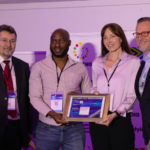Water and Sanitation Minister, Senzo Mchunu, has expressed satisfaction with the progress made in the Lesotho Highlands Water Project (LHWP) Phase 2, which is expected to be completed in 2028.
Mchunu met with the Minister of Natural Resources in the Kingdom of Lesotho, Mohlomi Moleko, during his visit to Maseru.
Mchunu’s visit was aimed at fast tracking the implementation of the LHWP Phase 2.
During his meeting at the Maseru Convention Centre on Friday, Mchunu said while the project previously encountered some challenges, which led to the initial deadline of 2020 being missed, there are now “some encouraging signs”.
“Considerable progress has been made in the project and we will have a good story to share when we return to South Africa. We can only look forward to this project growing but more importantly, we would like to strengthen our relations.”
The LHWP is a bi-national infrastructure project between Lesotho and South Africa, which involves the construction of a network of tunnels and dams to transfer water from Orange–Senqu River in the Lesotho Highlands to South Africa, and to utilise the water delivery system to hydro-electric power in the Kingdom of Lesotho.
The water transfer component of Phase 2 comprises an approximately 165-metre high concrete faced rockfill dam at Polihali, downstream of the confluence of the Khubelu and Senqu (Orange) Rivers, and an approximately 38 kilometre concrete-lined gravity tunnel connecting the Polihali reservoir to the Katse reservoir.
The completion of Phase 2 of LHWP will augment the transfer of water from Lesotho to South Africa, with extra 490 million m3/year from the current 780 million m3/year, to make it 1 260 million m3/year through the Integrated Vaal River System (IVRS).
The IVRS is the biggest system in the country, which comprises 14 dams with catchments in four provinces, namely the Free State, Northern Cape, Mpumalanga and North West.
Mchunu commits to speed up KwaNongoma bulk water supply
Meanwhile, Mchunu announced that work has started to determine an abstraction point from Jozini Dam into Mandlakazi Water Treatment Works as part of Phase 5 of the Mandlakazi Bulk Water Supply Scheme in KwaZulu-Natal.
Mchunu met with iNkosi Zulu of Mandlakazi, the Traditional Council and the community members of Esiphambanweni in KwaNongoma to give an update on the water supply scheme and its plans, which costs over R200 billon. A technical task team has since been established for the project.
The water supply scheme will bring relief to the people of Mandlakazi, between Kwa-Nongoma and Mkhuze towns, as well as KwaHlabisa, which is under uMkhanyakude District Municipality.
During a meeting in Emangqeleni in Esiphambanweni, Mchunu announced that a water use licence has been issued for the Zululand District Municipality to abstract an increased volume of water from Jozini Dam to Mandlakazi Water Treatment Works.
He said the high volume of water will ensure that the treatment works upgrades from producing 30 million litres per day of drinkable water to 60 million litres per day.
“It is important to note that the phases of this project will not take place at the same time, but we are promising that work will happen speedily in the beginning of 2023,” Mchunu said.
Mchunu explained that the project is conducted in different phases, and the department has appointed Zululand District Municipality to implement Phases 5 and 6, which will benefit 279 297 people.
“Phase 5 includes the construction of the main pipeline that will abstract water from Jozini Dam to Mandlakazi Water Treatment Works, and several other pipeline projects within the entire Mandlakazi project footprint. Phase 6 is about the construction of network water reticulation pipelines to provide water to the households of the entire Esiphambanweni community,” the Minister explained.












